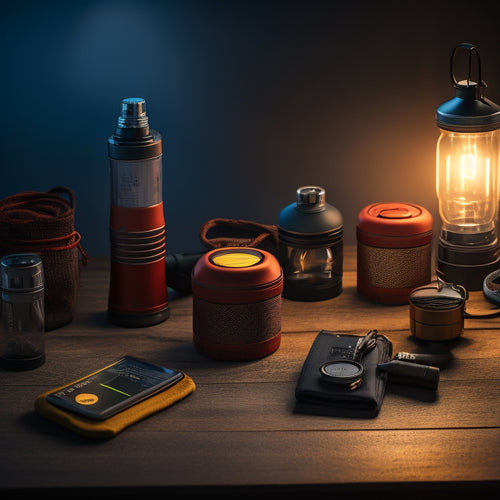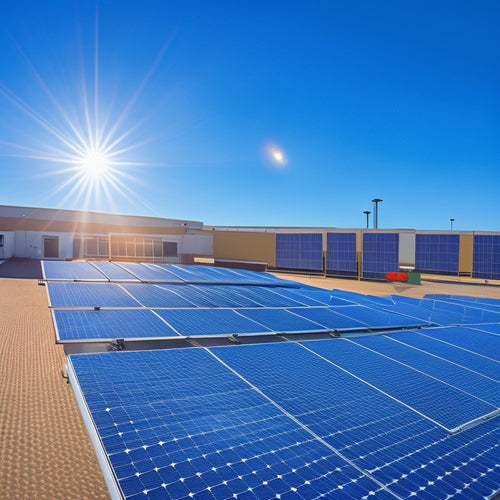
Camping Solar Power Tips for Beginners
Share
If you're new to camping with solar power, start with lightweight, portable solar panels that fit easily in your gear. Evaluate your energy needs to choose the right wattage; smaller panels handle devices like smartphones, while larger ones can power appliances. For ideal performance, position panels towards the sun at a 30-degree angle and keep them clean from dust. Consider investing in a solar battery for energy storage, ensuring you have power even when the sun isn't shining. This eco-friendly approach not only enhances your camping experience but also reduces your carbon footprint—there's even more to investigate on maximizing your setup!
At a Glance
- Choose portable solar panels with high efficiency (above 20%) for optimal energy output while camping.
- Conduct an energy audit to determine wattage needs for devices and select appropriate solar kits.
- Maintain solar equipment by regularly cleaning panels and inspecting connections for optimal performance.
- Position solar panels towards the sun at a 30-degree angle to enhance energy generation.
- Initial investment in solar power leads to long-term savings and energy independence during camping trips.
Eco-Friendly Energy Source
When you choose solar power for your camping trips, you're tapping into a clean and renewable energy source that benefits both you and the environment.
Solar generators offer reliable, renewable power for camping with quiet operation, making them an ideal choice for outdoor excursions.
Understanding the advantages of solar energy can help you make informed decisions about the right equipment for your needs.
Let's investigate how to maximize these benefits and select the best solar gear for your journeys, including considerations for powering off-grid excursions.
Benefits of Solar Power
Solar power offers numerous benefits that make it an ideal eco-friendly energy source for campers. By utilizing the sun's energy, you're reducing your carbon footprint and adopting a cleaner way to enjoy the great outdoors. With recent solar technology advancements, you can now access highly efficient and compact solar panels that fit seamlessly into your camping gear.
One of the biggest perks of using solar power while camping is the freedom it provides. Portable solar solutions allow you to charge your devices, run lights, and power small appliances without being tethered to a traditional power source.
Imagine setting up camp in a remote area and still having the energy you need to cook a meal or illuminate your tent at night!
Moreover, solar power is a reliable resource. As long as the sun's shining, you can generate energy even in the most off-grid locations.
This independence not only enhances your camping experience but also promotes a deeper connection with nature. So, if you're ready to adopt an eco-friendly lifestyle, consider integrating solar power into your next outdoor expedition!
Choosing Solar Equipment
Choosing the right solar equipment for your camping trip can greatly improve your outdoor experience. When you're out in nature, having dependable power means you can enjoy freedom and convenience. Start by considering solar panel types, as portable solar panels are often the best choice for camping. They're lightweight and easy to set up, making them perfect for off-grid setups.
Next, think about your solar battery options. A good battery will store energy, allowing you to charge devices overnight. Pair it with the right solar inverter choices to convert that stored energy effectively. Here's a quick reference table to help you decide:
| Equipment | Durability Factors | Maintenance Practices |
|---|---|---|
| Solar Panels | Weather-resistant | Regular cleaning |
| Solar Batteries | Temperature-tolerant | Check connections monthly |
| Charging Devices | Lightweight | Inspect for wear and tear |
| Solar Inverters | sturdy casing | guarantee proper ventilation |
Lastly, don't forget the solar kit essentials. Follow these installation tips and maintenance practices, and you'll be set for a fantastic camping expedition powered by the sun!
Cost-Effective Energy Solution
When considering solar power for your camping trips, it's important to weigh the initial investment against the long-term savings.
Off-grid solar kits offer an excellent solution for those seeking energy independence while enjoying the great outdoors. While upfront costs may seem high, the reduction in fuel expenses and the freedom from grid reliance can lead to significant savings over time.
By choosing solar, you're not just making a smart financial decision, but also investing in a sustainable energy solution for your outdoor excursions.
Off-grid solar kits can provide you with the energy you need without the hassle of traditional power sources.
Initial Investment Considerations
Investing in solar power for your camping trips can be a life-changing factor, offering a sustainable energy solution that pays off over time.
However, before diving in, it's essential to tackle budget planning and understand the upfront costs involved.
Start by evaluating your energy needs. How much power do you require for your devices? This will guide you in choosing the right solar kit.
Keep in mind that while initial investments might seem steep, they're often more affordable than you think when you consider the benefits.
Compare various options on the market, from portable solar panels to complete systems. Some brands offer budget-friendly kits that won't break the bank.
Remember, quality matters, so read reviews and seek recommendations.
You'll also want to factor in any additional equipment, like batteries or inverters, which can impact your overall budget.
By planning ahead and being mindful of costs, you can create a setup that not only meets your needs but also enhances your camping experience.
Welcome the freedom that comes with solar power, knowing you've made a smart investment that supports your outdoor excursions.
Long-Term Savings Potential
Once you've laid the groundwork for your solar power setup, it's time to explore how it can save you money in the long run. By utilizing solar energy, you're taking a significant step toward energy independence, which means you won't have to rely on conventional power sources that drain your wallet.
The concept of solar payback is vital here. Fundamentally, it refers to the time it takes for your initial investment in solar equipment to pay off through energy savings. Depending on your usage and local energy costs, you could see a return on your investment in as little as five years.
After that, you'll enjoy free power for decades!
Moreover, as utility rates rise, having your own solar system shields you from those increasing costs. You'll be able to enjoy the great outdoors without worrying about rising energy bills.
In the end, investing in solar isn't just about immediate savings; it's about achieving a lifestyle that welcomes freedom and sustainability.
Solar Panel Efficiency Ratings
When choosing solar panels for your camping expedition, understanding efficiency ratings is vital. Selecting high-efficiency solar panels with ratings above 20% can greatly enhance your energy output.
These ratings indicate how well a panel converts sunlight into usable energy, and various factors can impact this performance. For instance, assessing energy needs is essential to guarantee you choose the right solution for your outdoor energy needs.
Understanding Efficiency Ratings
Efficiency ratings are crucial for understanding how well solar panels convert sunlight into usable energy. When you're camping and relying on solar power, knowing these ratings can help you choose the right solar panel types for your needs.
Higher efficiency ratings mean that a panel can convert a larger percentage of sunlight into energy, providing you with more power in less space.
Typically, you'll find efficiency ratings ranging from 15% to over 22%. Monocrystalline panels tend to have the highest efficiency, making them a popular choice for those who want to maximize their energy conversion in a compact setup.
Polycrystalline panels are often more affordable but generally less efficient. Thin-film options are lightweight and flexible, but they usually lag behind in efficiency compared to the others.
Understanding these ratings helps you make informed decisions, guaranteeing you have ample power for your camping excursions. It's all about finding the right balance between space, weight, and energy needs.
Factors Affecting Performance
Several factors can greatly impact the performance of your solar panels, affecting how much energy you can harness while camping. One of the key elements is solar panel positioning. To maximize efficiency, you'll want to orient your panels towards the sun, ideally at a 30-degree angle. This way, you can capture sunlight more effectively throughout the day.
Weather impact is another vital consideration. Cloud cover, rain, and even dust can hinder your panels' ability to generate power. On cloudy days, expect reduced output, so plan your energy usage accordingly.
If you're camping in a particularly dusty area, make sure to clean your panels regularly to keep them performing at their best.
Also, the type of solar panel you choose can influence overall performance. High-efficiency panels may cost more upfront but can produce more energy in less-than-ideal conditions.
Ultimately, being aware of these factors allows you to better manage your energy needs while enjoying the great outdoors. Welcome the freedom of camping with solar, and make the most of the power available to you!
Selecting Based on Power Output
When selecting a solar power setup for your camping trip, start by determining your energy needs.
Conducting an energy audit will help you identify the devices you plan to charge and how much wattage they require.
Once you have that figured out, you can compare wattage options to find the right solar panel for your journey.
Determine Energy Needs
Understanding your energy needs is crucial for a successful camping trip powered by solar energy. By evaluating your power consumption, you can choose the right solar equipment and battery storage for your expedition. Start by listing the devices you'll use and their wattage requirements. This way, you can ascertain you've got enough juice to keep everything running smoothly.
Here's a simple table to help you visualize your energy needs:
| Device | Wattage | Hours Used per Day | Daily Consumption (Wh) |
|---|---|---|---|
| Smartphone | 10 | 2 | 20 |
| LED Lantern | 5 | 5 | 25 |
| Portable Fridge | 50 | 10 | 500 |
| Laptop | 60 | 3 | 180 |
| Drone | 20 | 1 | 20 |
Calculate your total daily consumption by summing the last column. This total will guide you in selecting the right solar panel and battery storage that can meet your needs, allowing you the freedom to enjoy the great outdoors without worrying about power!
Compare Wattage Options
Selecting the appropriate wattage options for your solar setup can significantly influence your camping experience. When you explore wattage comparison, you'll discover that not all solar panel types are created alike. Different panels output varying amounts of power, which means understanding your needs is vital.
For example, if you're aiming to power small devices like lights or a portable charger, a lower wattage panel (around 50-100 watts) might suffice. However, if you plan on operating appliances like a mini fridge or a small heater, you'll want to choose higher wattage panels (200 watts or more) to guarantee you've got enough power.
It's also important to evaluate the efficiency of the solar panel types. Monocrystalline panels are typically more efficient than polycrystalline, meaning they produce more power in less space. This can be a transformative factor when it comes to portability and ease of setup.
Ultimately, aligning your wattage options with your energy needs will lead to a more enjoyable and liberated camping experience. So take the time to assess your requirements, and you'll be ready to hit the road with confidence!
Lower Carbon Footprint Overall
When you're camping, choosing solar power can greatly reduce your carbon footprint.
By utilizing the sun's energy, you're opting for a sustainable energy source that minimizes environmental impact.
Plus, using solar power not only helps the planet but also enhances your outdoor experience with clean, renewable energy.
Sustainable Energy Source
As you plan your next camping trip, consider how utilizing solar power not only enhances your outdoor experience but also greatly lowers your carbon footprint. By utilizing renewable energy, you're not just enjoying nature; you're preserving it for future generations.
Here's a quick comparison of popular solar panel types to help you choose the best fit for your journey:
| Solar Panel Type | Benefits |
|---|---|
| Monocrystalline | High efficiency, space-efficient |
| Polycrystalline | Affordable, good performance |
| Thin-film | Lightweight, flexible |
These solar panel types cater to different needs, so you can select the one that fits your camping style. Whether you're powering a small gadget or a larger device, using solar energy reduces reliance on fossil fuels, decreasing greenhouse gas emissions.
As you adopt solar power, you'll not only enjoy the freedom of off-grid living but also contribute to a sustainable future. So pack your solar gear, and get ready to soak up the sun while enjoying the great outdoors!
Frequently Asked Questions
How Do I Maintain My Solar Panels While Camping?
To maintain your solar panels while camping, regularly clean them to remove dirt and debris. Check connections for wear, and monitor performance. These simple solar panel care and maintenance tips guarantee you enjoy uninterrupted energy freedom.
Can I Use Solar Power During Cloudy Weather?
Yes, you can use solar power during cloudy conditions. While solar efficiency decreases, your panels still generate energy. Just make certain you've got enough battery storage to maximize power use when the sun's not shining.
What Types of Solar Lights Are Best for Camping?
When choosing solar light types for camping, consider options like portable solar lanterns, string lights, and pathway lights. These camping light options provide versatility and ambiance, ensuring you enjoy your outdoor excursion under the stars.
How Long Do Solar Batteries Typically Last?
Did you know that solar batteries can last anywhere from 5 to 15 years? Their lifespan largely depends on solar battery efficiency, so choosing quality batteries is essential for maximizing your outdoor freedom and enjoyment.
Are There Portable Solar Generators for Camping?
Yes, you can find portable solar generators for camping. They come in various solar panel types and generator capacities, allowing you to choose one that fits your needs, ensuring you stay powered while enjoying the outdoors.
Explore More
By utilizing the sun's energy, you're not just charging your devices; you're embracing a brighter, greener future. Envision yourself sipping coffee under a towering pine, the soft hum of your solar setup powering your music. You're saving money and reducing your carbon footprint, all while enjoying nature's beauty. As you commence your camping excursions, remember these tips to make the most of your solar power. Let the sun be your guide, lighting up your outdoor experience!
Related Posts
-

Is This the Future of Alternative Energy Systems
Yes, alternative energy systems are shaping the future of energy. Innovations in solar and wind technologies are driv...
-

Best Solar Powered Flashlights for Emergency Situations
When you're choosing the best solar-powered flashlights for emergency situations, focus on their brightness, battery ...
-

Essential Solar Panel Mounts for Commercial Properties
When it comes to essential solar panel mounts for your commercial property, durability and wind resistance are key fa...


